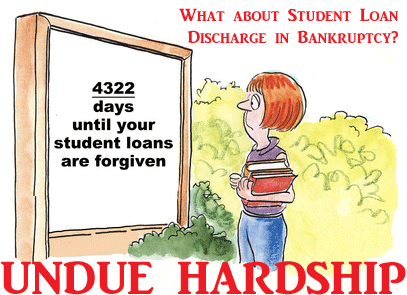Despite the myth, student loans can be discharged and wiped away in a bankruptcy. The problem is that two hoops have to be jumped through in order for them to be discharged and one of those hoops is really, really tiny.
Hula Hoop #1-Student Loan Adversary Proceeding
Unlike most debts that are automatically discharged by the Bankruptcy Court, student loans require a debtor to file something called an Adversary Proceeding to determine whether the student loans can be discharged. The student loan exclusion from discharge is self-executing, meaning the debtor must affirmatively secure and establish a hardship determination in order to have the student loan debt discharged.
An Adversary Proceeding can be viewed as an ordinary lawsuit brought by the debtor against the student loan companies the debtor has loans with.
Hula Hoop #2-Undue Hardship
11 U.S.C. 523(a)(8) states that a debtor’s discharge does not discharge student loans, “unless excepting such debt from discharge under this paragraph would impose an undue hardship on the debtor and the debtor’s dependents.”
The burden of proving an undue hardship is upon the debtor and it must be established by a preponderance of the evidence. This is generally understood to mean that the evidence presented to the Court established a more probable than not assertion of an undue hardship. This standard is a much lower burden than the “beyond a reasonable doubt” standard imposed in criminal cases.
Undue hardship is not defined by the Bankruptcy Code so Courts have established their own methods, or tests, of determining whether undue hardship exists.
Eighth Circuit Court of Appeals Undue Hardship Test
The Nebraska Bankruptcy Court is within the U.S. 8th Circuit Court of Appeals, which has established a “totality of the circumstances” test in determining undue hardship.
In reviewing the totality of the circumstances of the debtor, a court must consider:
- the debtor’s past, present, and reasonably reliable future financial resources;
- the debtor’s reasonable and necessary living expenses;
- and any other relevant facts and circumstances.
In a 2003 opinion, the 8th Circuit Court of Appeals noted that the burden of proving an undue hardship is “rigorous”.
“Simply put, if the debtor’s reasonable future financial resources will sufficiently cover payment of the student loan debt–while still allowing for a minimal standard of living–then the debt should not be discharged.” Long v. Educ. Credit Mgmt. Corp., 322 F.3d 549, 554-55 (8th Cir. 2003).
Conclusion
Student Loan discharge cases are extremely fact dependent. Needless to say, however, it is still difficult to get a bankruptcy court to discharge student loan debt.
If you think your have an undue hardship that would merit requesting a discharge of your student loan debt in bankruptcy, and you live in Nebraska, contact me to discuss your situation. You can call, email, or schedule an appointment online.
